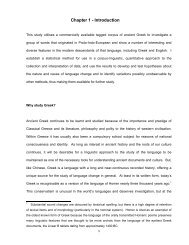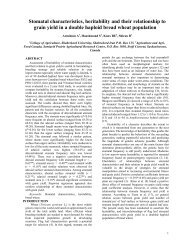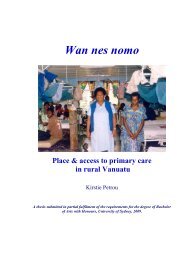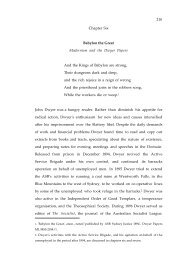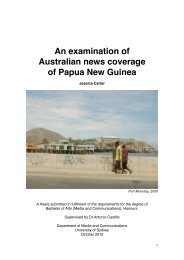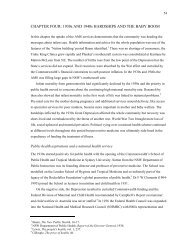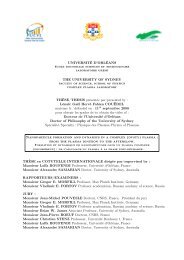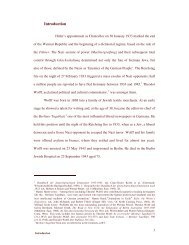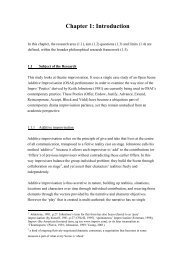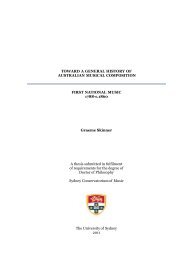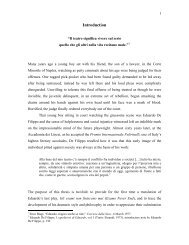journal of digital research & publishing - The Sydney eScholarship ...
journal of digital research & publishing - The Sydney eScholarship ...
journal of digital research & publishing - The Sydney eScholarship ...
Create successful ePaper yourself
Turn your PDF publications into a flip-book with our unique Google optimized e-Paper software.
1 P M J O U R N A L O F D I G I T A L R ESEARCH & P UBLISHING<br />
<strong>The</strong>se are just some <strong>of</strong> the factors intersecting in recent years, setting the scene for a rise<br />
in what are known as ‘patient advocates’ in the health care space. <strong>The</strong> patient advocates <strong>of</strong><br />
concern to this paper act for thousands <strong>of</strong> people, rather than for the individual, and most<br />
commonly ‘specialise’ in one type <strong>of</strong> illness. <strong>The</strong>y generate a substantial following with<br />
their command <strong>of</strong> Internet publication modes, challenge traditional notions <strong>of</strong> medical<br />
authority and they are not going away anytime soon.<br />
As far back (relatively speaking) as 1973, long before the Internet became the pervasive<br />
communication technology in the developed world, medical sociologist Marie Haug<br />
$8%"6$4%8& 3& 6>%"8& 7D& 8%]'>7D%**$7"3#$*36$7"& 7D& 6+7*%& G7>H$",& $"& 6+%& 0%8$53#& 4%#8& $"&<br />
postindustrial society largely due to technology opening up access to information. She<br />
argued that this came about as a result <strong>of</strong> technological advancement and that the de<br />
pr<strong>of</strong>essionalisation is characterised by loss <strong>of</strong> ‘‘their monopoly over knowledge, public<br />
belief in their service ethos, and expectations <strong>of</strong> work autonomy and authority over the<br />
client’’ (1973, p. 197).<br />
More recently, survey data from the US clearly demonstrates that both patients and<br />
general Internet users alike are accessing the Internet in large numbers for health<br />
information. A 2003 study (Von Knoop, Lovich, Silverstein, & Tutty,2003) found that<br />
80% <strong>of</strong> all patients go online for healthrelated information and that <strong>of</strong> those within a<br />
certain segment (who desire the greatest control in their health care), slightly more prefer<br />
to get their health information from the web (46%) rather than from their doctor (45%)<br />
(Von Knoop et al., 2003). More recent <strong>research</strong> by <strong>The</strong> Pew Internet and American Life<br />
Project (Fox and Jones: 2009) reports that 74% <strong>of</strong> American adults use the Internet and<br />
that 83% <strong>of</strong> them look online for health information (regardless <strong>of</strong> whether they have a<br />
chronic disease or not). However, 86% <strong>of</strong> the respondents from the most recent survey are<br />
also still getting this information from a health pr<strong>of</strong>essional. Health information and the<br />
access to it is just one <strong>of</strong> the many factors at play in the shifting landscape <strong>of</strong> health care<br />
and the construction <strong>of</strong> authority.<br />
This paper will look at the social and technological context in which patient advocates<br />
have come in to existence and the factors driving their rise to prominence. <strong>The</strong> focus<br />
<strong>of</strong> this paper is on the United States owing to the majority <strong>of</strong> existing <strong>research</strong> and<br />
literature originating there. However, the content is also applicable in most instances to<br />
other developed nations, due to the global nature <strong>of</strong> the Internet and similar cultural and<br />
medical constructs.<br />
138




